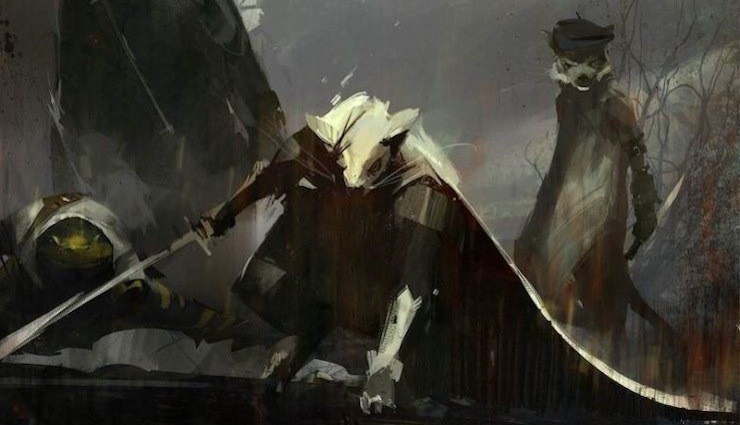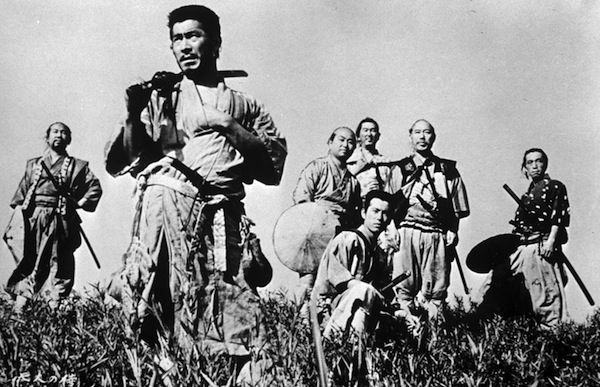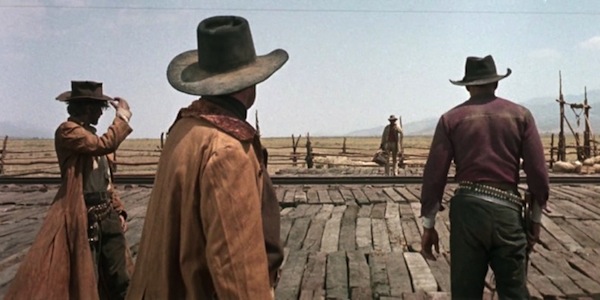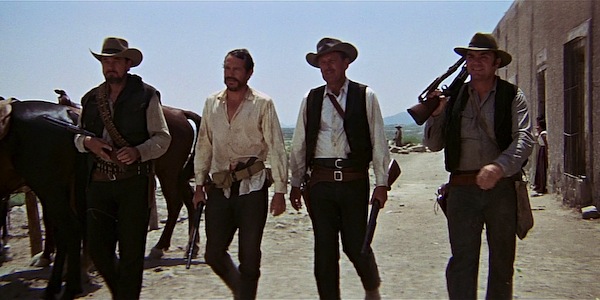The Builders is a straight love letter to pulp. A tale of anthropomorphic animals killing each other in a fantastical western setting, it is, Frankenstein-like, composed of any number of other tales. Some of the corpses I carved from follow; if you’re familiar with any of them, my apologies for that subtle feeling of annoyance that someone else has laid a claim on your own pop culture gem. If you aren’t familiar, get ready to blow a C-note or so at your local media depot, because the following 6 (yeah, that’s right, there are 6, I know 5 per list is traditional but that’s just how I roll, OK? Don’t try and shackle me with your bourgeois norms!) films and novels are knock-your-socks-off enjoyable. And when you’re done with them, maybe check out the first few chapters, and then if you dig it then maybe just go ahead and buy the damn thing…
Seven Samurai, directed by Akira Kurosawa
There are a lot of reasons that Seven Samurai is widely regarded as Kurosawa’s masterpiece despite some very, very stiff competition. For me though, frankly, it is the pure pulp elements that always stand out. I’m a sucker for the ‘getting a gang together’ narrative, and if he didn’t invent it (did he invent it?) then he sure as shit perfected it. The little thumbnail sketches we get of each of the samurai give you just enough to hang affection on, excellent economy of storytelling, and then when they start dying you’re like, ‘No! Not the funny one! He was so good-humored!’ And so on.
Heat, by William Goldman
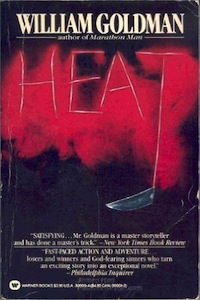 The Builders has a lot of fighting. Tons of it, really. That was sort of the joke for me when I first started writing it, seeing how much animal-on-animal violence I could shove into 35 thousand words (answer: lots.) But for all its ubiquity in the fantasy/sci-fi/western/thriller genres, actually writing a good action scene is really, really difficult. Either it ends up being so complicated that you need graph paper or a fully articulated action figure to determine what the hell is going on, or it’s lacking in all narrative weight, or it’s just flat out stupid. Goldman (author of The Princess Bride, the script for Butch Cassidy and the Sundance Kid—a genius, generally speaking) has a real talent for crafting fight scenes which are fast-moving, mean, authentic-seeming and (most importantly) which do something to reveal the motivations and personalities of the characters involved. Heat, the story of the ‘the greatest killer in the world at 10 yards or under’, is chock-full with nasty scenes of thoroughly enjoyable brutality. Everything he’s written is worth a read but start there.
The Builders has a lot of fighting. Tons of it, really. That was sort of the joke for me when I first started writing it, seeing how much animal-on-animal violence I could shove into 35 thousand words (answer: lots.) But for all its ubiquity in the fantasy/sci-fi/western/thriller genres, actually writing a good action scene is really, really difficult. Either it ends up being so complicated that you need graph paper or a fully articulated action figure to determine what the hell is going on, or it’s lacking in all narrative weight, or it’s just flat out stupid. Goldman (author of The Princess Bride, the script for Butch Cassidy and the Sundance Kid—a genius, generally speaking) has a real talent for crafting fight scenes which are fast-moving, mean, authentic-seeming and (most importantly) which do something to reveal the motivations and personalities of the characters involved. Heat, the story of the ‘the greatest killer in the world at 10 yards or under’, is chock-full with nasty scenes of thoroughly enjoyable brutality. Everything he’s written is worth a read but start there.
Once Upon a Time in the West, directed by Sergio Leone
The plot of Once Upon a Time in the West is farcical and semi-coherent; the characters’ motivations never make any sense, and it’s frankly kind of interminable, but still—no one ever staged a shoot-out like Sergio Leone. Every shot could be blown up into a painting and hung on a wall. The opening scene—fifteen minutes of hard men waiting for a train, tension building, and building, and building, and then the inevitable bloody denouement—is one of my favorite things in cinema. I pretty much destroyed my brother’s VHS copy rewatching it. When Harmonica shows up—wait, I’ll just show you.
I mean, look at that. LOOK AT THAT. What could possibly be a more mythic introduction? It’s Harmonica! He doesn’t even have a name! SHIT IS ABOUT TO POP OFF. OK, I have to take a break from writing this and go watch it. [Author’s Note: Still amazing.]
The Wild Bunch, directed by Sam Peckinpah
Peckinpah’s tale of very, very bad men doing very, very bad things to slightly worse men remains as disturbing and ferocious as it was forty years ago. It’s at once a phenomenal action movie and a vicious condemnation of the usual mindless John Wayne shoot-em-ups, and the ending—well, look, let’s just say that if anyone ever does a super-cut of the opening of Once Upon a Time in the West and the closing scene of The Wild Bunch, bam, there would go most of my productivity for the week. Wait, how come no one has done this yet? Anyway. Yeah, The Wild Bunch. I just completely ripped it off for The Builders. I mean, not to the point where his estate has a legal case or anything, but…maybe kind of close.
The Dogs of War, Frederick Forsyth
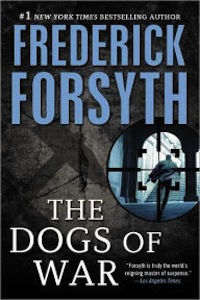 I love this book, and everyone I’ve ever given it to has also loved it, and if you don’t love it then don’t tell me because it probably means we can’t be friends anymore. More famous for his also-excellent Day of the Jackal, Forsyth was a war correspondent during the Biafran conflict, and used his experience there to write this story of European mercenaries staging a coup in a small African country. Buy it, get a beer, burn through it in a couple of hours, try not to get so excited while reading it that you do like Maggie Thatcher’s kid and attempt to re-enact it in Equatorial Guinea.
I love this book, and everyone I’ve ever given it to has also loved it, and if you don’t love it then don’t tell me because it probably means we can’t be friends anymore. More famous for his also-excellent Day of the Jackal, Forsyth was a war correspondent during the Biafran conflict, and used his experience there to write this story of European mercenaries staging a coup in a small African country. Buy it, get a beer, burn through it in a couple of hours, try not to get so excited while reading it that you do like Maggie Thatcher’s kid and attempt to re-enact it in Equatorial Guinea.
Redwall, by Brian Jacques
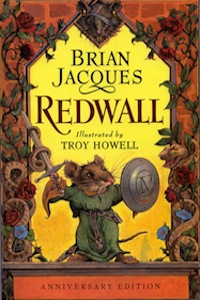 As far as books about animals acting like people goes, The Wind in the Willows is cuter, Watership Down is far the more profound, but what can I tell you? I have a thing about mice with swords. Apparently, so did most of the rest of the world because there are about 40 of these books. Wait, I’m going to check—OK, 22, but still, that’s a lot of books about animals killing each other. I think I only read the first few, but clearly they had enough of an effect on me to crib from them twenty-five years down the line.
As far as books about animals acting like people goes, The Wind in the Willows is cuter, Watership Down is far the more profound, but what can I tell you? I have a thing about mice with swords. Apparently, so did most of the rest of the world because there are about 40 of these books. Wait, I’m going to check—OK, 22, but still, that’s a lot of books about animals killing each other. I think I only read the first few, but clearly they had enough of an effect on me to crib from them twenty-five years down the line.
There’s a lot more—wait, shouldn’t this list have 100 Bullets on it? Shit yeah, it should—but I’m over the line anyway with six. Anyhow, The Builders will be released on November 3rd, please buy it, all proceeds go to the legal defense fund I’m going to need once Peckinpah’s kids get a look at the text. Just kidding, hahaha, all proceeds go to booze.
Daniel Polansky is the author of four novels, including the Low Town series which began with The Straight Razor Cure, and Those Above, the first book in the Empty Throne series, as well as the new Tor.com novella The Builders. He was living in Brooklyn when he wrote this, but by the time you read it he might be somewhere else.










